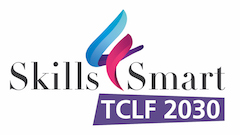On October 2nd, S4TCLF’s partners held an international workshop titled “Towards a European network of VET providers”. This workshop aimed to gather VET providers to present the Skills4Smart project and convince them to enrol themselves in the piloting phase of the project. It was also an opportunity to present the project’s developments in terms of new curricula and occupation profiles, as well as direct and long-term implications of the Covid-19 crisis in education and vocational training. This webinar was attended by over 40 people from 12 countries, representing VET providers, organisations representing the TCLF industries on a national level, and companies.

Katarzyna Sulisz, Project Officer at EURATEX (European Apparel and Textile Confederation), started the round of presentations by introducing to the skills strategy for the TCLF industries for 2030. She highlighted key figures related to the skills and employment in the TCLF industries, and the need for skills modernisation to better adapt to current and future needs of the industry. She presented the different phases of the project and the tools designed to accompany the process as well as the different scenarios of how the TCLF industries may look like in the future. Five presented scenarios- “Renaissance of craft”, “A brave new world”, “Selective leadership”, “Walled Gardens” and “Industrial sunset” – were created by project partners to estimate skills and job needs in the TCLF industries by 2030. To learn more about the scenarios, please the check section “Results” on the project website.
Aura Mihai, Professor at the Gheorghe Asachi Technical University of Lasi, was in charge of explaining the entities and curricula for 8 high-demand job profiles for the TCLF industries, developed in the project and soon to be tested in the piloting phase. The profiles are divided into 4 transversal (Sustainability Technician, Digital Supply Chain Specialist, Digital Marketing Professional, and Process Production Timeline Analyst) and 4 sectorial (Textile Technologist, Leather Technologist, 3D CAD Footwear Developer, Clothing CAD Pattern Maker). Ms. Mihai recalled during the Q&A that these 8 MOOCs would be free for use. Students and trainers interested in the materials should contact project partners to participate in piloting activities.
Elisa Pagliaroli, Strategic Consultant at SPIN30, presented how Covid-19 has impacted and changed education. Since all schools were closed for several months, we had to adapt, and it greatly impacted the way of teaching. The impact of the crisis led policy-makers education professionals to find innovative solutions to solve the challenges encountered in this new setting: rising of e-learning and remote teaching, keeping students and apprentices engaged in supporting vulnerable learners, grading, and assessing students. Elisa provided us with very different examples and indicated that best practices cannot be suitable for every country. She concluded that the next steps would involve making VET more responsive and accelerate the digital transformation.
Carmen Arias, General Secretary of the European Footwear Confederation (CEC), introduced the network of TCLF Centres of Vocational Excellence. She recalled the Commission’s definition of Centre of Vocational Excellence and highlighted that VET centres can be drivers for applied innovation, and can help foster change in a situation like Covid-19. She emphasized the importance of modernising VET as well as the importance of having reliable partners at the regional, national, and international levels.
Participants of the webinar were invited by the speakers to join the final workshop, which will summarise outcomes of series of national workshops on the 3rd of November as a part of the European VET Skills Week 2020. During the workshop, the structure of the network of VET will be unveiled together with the next steps to build strong collaboration among education providers for TCLF industries.
Want to know more details? Check the agenda and register here.
Katarzyna Sulisz – Euratex

